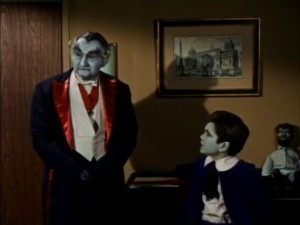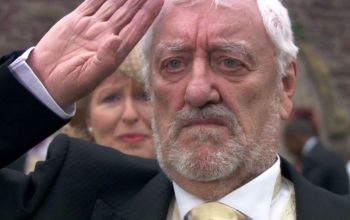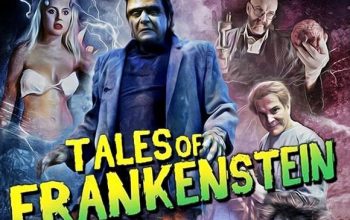Munsters Go Home – 1966
A while back, I had a look at the Munsters in general. This time, I’m going to look at the Munster’s only cinematic release, Munsters Go Home.
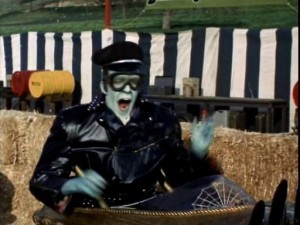
The Munsters learn that Herman (Fred Gwynne) has inherited a valuable estate and a noble title from his adopted family in England. Lily (Yvonne de Carlo) later explains that Herman was adopted by the noble Munster family after leaving Dr Frankenstein’s lab. They take passage on a steamer to England. Herman gets seasick the instant they leave port, Marilyn has a shipboard romance with a rich guy with an indeterminate accent (Robert Pine).
Meanwhile in Munster Hall, the disinherited English Munsters (Effigie, Grace and Freddie, played by Hermione Gingold, Jeane Arnold and Terry-Thomas, respectively) are plotting against the American Munsters. They answer to a mysterious leader called the Gryphon, who orders them to frighten Herman and his family away.
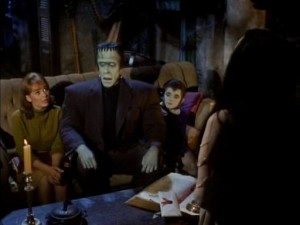
We cut to an English pub full of people with terrible, terrible, terrible, come-back-Dick-van-Dyke-all-is-forgiven terrible Cockney accents. Terrible. And the pub’s in the country, so there’s no reason for any of the inhabitants to be Cockney’s anyway. Bloody terrible.
What was I saying?
Oh, yeah. Some of the locals have been taking ‘coffins’ to Munster Hall where there is said to be a mysterious secret. The English Munsters lie in wait to scare the American Munsters off. This works about as well as you’d expect.
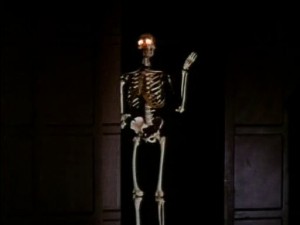
The American Munsters meet their English counterparts. Marylin’s romance takes a bad turn when she learns that his family has a motorsports-based feud with the Munsters. Herman and Grandpa to investigate and discover counterfeit money beneath Munster Hall.
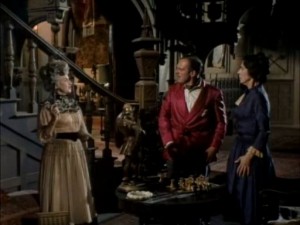
The English Munsters set up their new plan which, inevitably, is to blow Herman up in the motor race against Marylin’s boyfriend’s family. Grandpa and Lily figure out the plan but are tied up by Freddie before they can warn Herman. The mysterious Gryphon knocks out Marylin’s boyfriend and takes over his car (we see the Squire in the stands, so it’s not him. This actually surprises me). Herman turns up at the race in Grandpa’s coffin shaped sportscar the DRAG-U-LA.
Grandpa and Lily slowly and farcically escape. The race starts – my word, the roads in England do look quite a lot like the road in Southern California, don’t they? Herman zooms to the lead in spite of the Gryphon’s attempts to run him off the road. Grandpa and Lily race to Herman’s aid to a score of tinkling old-timey chase music. Grandpa ends up turning into a wolf to get to Herman, but gets chased by a foxhunt. There’s a sequence of every car chase related visual gag this side of the Keystone Kops.
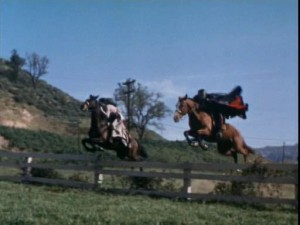
Look, long story short, Lilly saves Herman, who wins the race. Marilyn’s boyfriend escapes, proving that he wasn’t the bounder who was running everyone off the road. The Gryphon’s final murder plot fails and she’s revealed to be the barmaid from the pub (Maria Lennard).
Honestly didn’t see that particular plot twist coming.
The English Munsters are arrested. The American Munsters give Munster Hall to the village local. Marylin and her boyfriend kiss. The Munsters return home. The end.
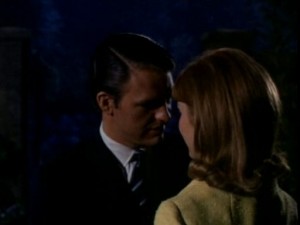
Thoughts on the movie… Firstly, the Munsters look pretty damn awful in colour. Other than that, the film is basically an extended episode of the show. The jokes are mostly predictable, but some of them raise a chuckle. Usually this is more due to the charm of Fred Gwynn and Al Lewis rather than the skill of the writers. Take for example Herman’s line when he meets the English Munsters’ butler (John Carridine!):
“I am a simple man. A man of the people. You can call me simply… Lord.”
On paper, it’s not great — a too-long setup to an obvious punchline. But Fred Gwynn delivers it well enough to make me chuckle.
The visual gags are honestly a lot better than many of the verbal jokes. The final race scene may be clichéd, but there’s I can’t fault the technical aspects of shooting editing and timing. And Lily gets to save the day twice, good for her.
The usually enjoyable English comic actor Terry-Thomas is a bit hit-and-miss here. He has a very specific range in which he’s brilliant, and his British screenwriters were pretty good about keeping him inside that range. The writers on Munsters Go Home have him somewhere on the edge of his ability. For every time he raises a smile, he has another line which just embarrassing.
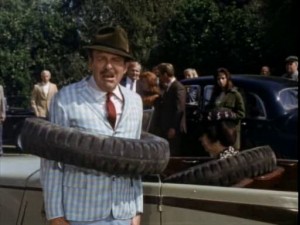
The plot is pretty simple and clichéd, but I guess that’s not really a valid criticism. The plot exists merely to string gags off of so it doesn’t really matter. The writers’ attempts to recreate various English dialects is unintentionally, and their depiction of English country life is (I suspect) not well researched.
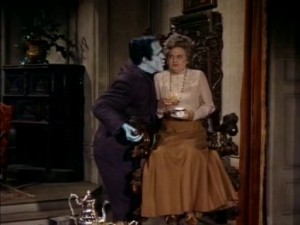
In spite of being rather hit and miss, the movie has a certain charm. I don’t quite know how to describe it. The Munsters was never a particularly funny show, and the extended time and budget of a movie doesn’t help them much. But still there’s something just likeable about the Munsters. Partly it’s the charm of the actors, but mostly it’s just the way the Munsters have no conception that anyone might think them unusual. It’s a weird sort of innocence. I don’t want to get into a whole ‘wasn’t TV better in the old days’ thing because for the most part it wasn’t. But I think it’s fair to say that innocence is not something you see a lot of on TV these days — and maybe that is a mistake.
Next: what if the Munsters weren’t so innocent?
PS: Munsters Go Home also had Butch Patrick as Eddie Munster, but I try not to dwell on such things.
